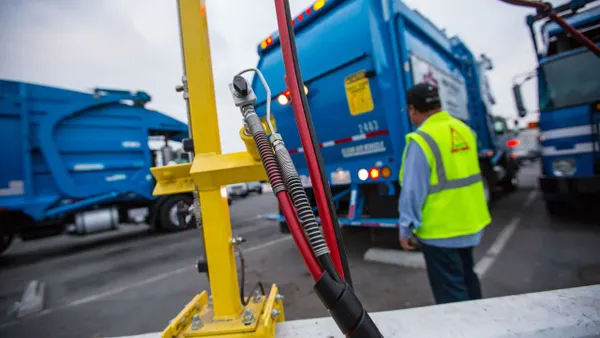Dive Brief:
- The World Biogas Association (WBA) and C40 Cities have released a report, titled "Global Food Waste Management: An Implementation Guide For Cities," that aims to help policy makers in cities improve the management of food waste.
- The report, which was presented to the mayor of Rotterdam on Wednesday, outlines for city leaders the sources and impact of food waste; how to prevent and collect food waste; an overview of treatment technologies; a detailed description of anaerobic digestion (AD) and its products; and policy recommendations, barriers and implementation of sustainable food waste management.
- Policy recommendations include undertaking large-scale food waste awareness campaigns; requiring businesses to separately collect food waste' providing separate food waste collection containers to households; and requiring all food waste to be "used" or processed through animal feed, composting or AD.
Dive Insight:
WBA launched during the United Nations Convention on Climate Change COP22 in 2016, which cemented its roots in helping the United Nations (UN) meet sustainability targets globally. The UN Food and Agricultural Organization (FAO) reports 1.3 billion metric tons of food are wasted every year — about one-third of all food produced globally. In order to reach the UN Sustainable Development Goal of halving this waste generation per capita at the retail and consumer level by 2030, cities must overcome the barriers of policy implementation and enact efficient waste collection and processing systems.
This report highlights a number of food waste processing technologies — AD, in-vessel composting, windrow composting, liquefaction and rendering — though it is clear that WBA is partial to AD due to its ability to support food waste reduction while creating energy and promoting nutrient recovery. "The flexibility of AD and its ability to provide a multitude of benefits is unique," the report reads. "Due to the efficiency of the AD process, making use of naturally-occurring microorganisms to break down waste, AD can recover up to 60% more energy from food waste than other technologies."
Expanding anaerobic digestion capacity is considered a key part of meeting federal and local organic waste diversion goals in the U.S. as well. A recent report from the Commission for Environmental Cooperation found approximately 75 million metric tons of organic waste are processed via composting or AD in North America every year. However, while new projects continue to launch throughout the country, critics feel this isn't happening fast enough and more could be done to support the expansion of processing infrastructure.
By bringing a global perspective on what is working elsewhere — this particular report highlights success stories in Oslo, Aukland and Milan — WBA's recommendations could help accelerate this growth in the U.S.










